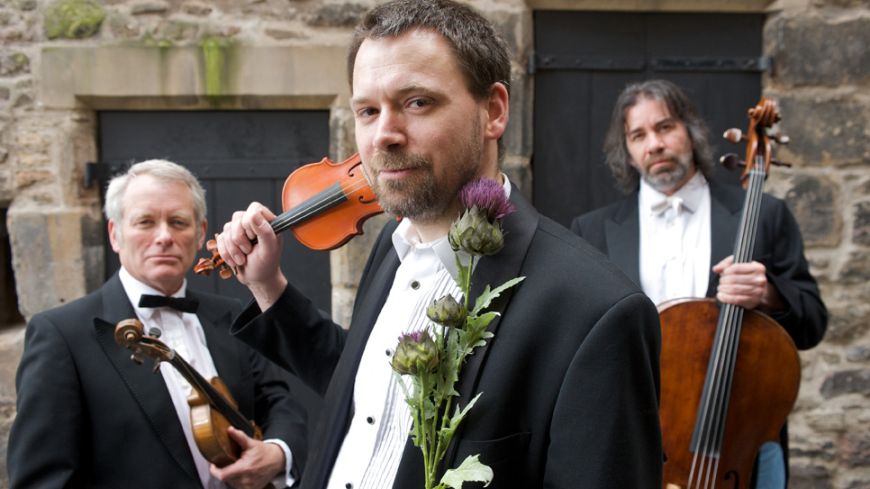
Red Note Ensemble is a Scottish-based professional music ensemble that made its debut in 2008. Based on an observation that "compositional software ...out of range notes [would turn] red ..." when faced with the innovation of Bill’s Sweeney’s work, it was decided that "Red Note will be the group that will play the unplayable.” And so Red Note was baptised.
This highly talented group performs established classics of contemporary music, commissions new music and develops the work of new and emerging composers. In keeping with that ethos, three of the Ensemble generously played a short piece written by one of their roadies, Richard Greer, before their performance of A Drunk Man looks at the Thistle. He even got to introduce his own work! They are currently the Contemporary Ensemble-in-Residence at the Royal Scottish Academy of Music Drama in Glasgow, and an Associate Company of the Traverse Theatre, Edinburgh.
Hugh MacDiarmid's famous epic poem, that looks at the Scottish psyche from the wide perspectives of culture, sex, politics, science, existentialism, metaphysics and the cosmos, was written in 1926. This musical version was originally commissioned by Glasgow’s MayFest in 1992. The current adaptation, in Sweeney’s words, takes the form of “...a kind of four-act internal opera where the [musical] stylistic discontinuities parallel the poem’s multiplicity of philosophical viewpoints”.
This complex arrangement is laid out in the comprehensive programme where the movement and outline styles are listed over three pages. Further on, is the full text of the poem used in this adaptation (that much of this concert audience read like dutiful pupils throughout the performance) with an English version alongside.
Slumped at a table in the corner of the stage amid papers and giant thistles and of course a bottle, the Narrator, Crawford Logan, passionately performed MacDiarmid's text with curmudgeonly intensity in his perfect rich, Scots voice. He liberated it in his starry waistcoat and even did so in the unfortunate Jimmy hat. Surely MacDiarmid would not have approved of that piece of High Street kitsch. This piece is a marriage of poetry and music but the Narrator was physically dominated by the ensemble on stage. He was clearly outnumbered, but could have been given a more prominent position to indicate the balance of the relationship between the genres.
While Logan absorbed the character of the poet’s thrawn Scots narrator, MacDiarmid's Scots did not sit well with the style of singing and this listener found it gey hard tae unnerstaun , as it sounded like a foreign language possibly because it was spoken and sung as such.
Next door in the Usher Hall, The Proclaimers were in concert. Maybe they could be recruited as speech coaches as the passion was lost in some of the vowel sounds used. It felt like an ill-fitting garment. Consequently, the poets’ anger, passion and humour sat ill against the formality of dress.
The Ukulele Orchestra of Great Britain, while doing something very different, does manage this trick of being formally dressed while being funny and highly musical through their great use of humour and irony. Tak tent!
This is a, cerebral, intellectually challenging and ambitious piece. MacDiarmid’s poetic language was a contrived literary Scots written from a radical ideological stance, with a view to influencing a cultural and political Scottish Renaissance. This complex musical adaptation mirrors his sentiments and is throwing light again on this important subject.
The audience loved it.
Tour ended

